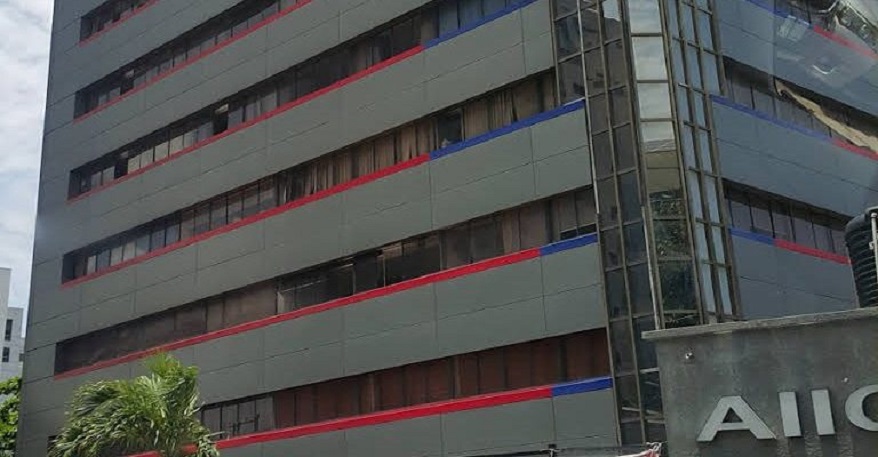Economy
AIICO Boosts GWP by 12.2% as Profit Dips 17.6% in Q1’21

By Adedapo Adesanya
Leading insurance company, AIICO Insurance Plc, recorded a 12.2 per cent growth in its Gross Written Premium (GWP) to N19.7 billion in the first quarter of 2021 from N17.6 billion recorded in the corresponding quarter of 2020.
According to the company, the increase was due to a year-on-year rise of 34.0 per cent in the general insurance business (35.7 per cent of gross written premiums) to N7.0 billion as against N4.6 billion recorded in Q1 2020.
However, the profit after tax declined by 17.6 per cent year-on-year to N1.5 billion in the first quarter of 2021 from N1.9 billion in the first three months of last year.
It was observed that the profit before tax increased by 11.3 per cent year-on-year to N1.6 billion in Q1 2021 from N1.4 billion in Q1 2020 on the back of improved overall profitability in the insurance businesses (Life, General and HMO).
AIICO revealed that it recorded an underwriting profit of N27.7 billion in Q1 2021 compared to the N131.0 million loss posted in Q1, noting that it was attached to changes in sovereign bond yields, which impacted the value of the company’s liabilities and assets.
In the life business, the firm explained that it was typically concerned about whether there is a surplus or deficit of assets over liabilities because of these movements. However, because of limitations in financial reporting, changes in liabilities affect underwriting profits while changes in assets are reported below underwriting profits.
“The effect is the significant variation in underwriting profits especially in volatile investment yield environments, such as we have in Nigeria. During Q1 2021, annualized yields rose by 430 basis points to 11.7 per cent at the long end of the yield curve, leading to a reduction in the fair values of assets and liabilities; the reduction in liabilities led to positive underwriting profit while the reduction in assets is reflected in the fair value losses for the period,” it said.
According to the firm, the total investment income declined to a loss of N24.1 billion in Q1 2021 compared to N4.7 billion in the same period of last year. This came as the federal government’s bond yields rose, affecting the fair value of the company’s financial assets. FGN bonds make up most of AIICO’s investment portfolio.
It was revealed that profits in its wealth management business declined in Q1 2021 as capital markets turned bearish during the quarter.
Total assets declined by 11.1 per cent to N216.2 billion in Q1 2021 as against N243.1 billion in the preceding year driven by a reduction in financial assets (-9.3 per cent; 79.0 per cent of total assets) and cash and cash equivalents (-38.2 per cent; 9.1 per cent of total assets).
Total liabilities declined by 13.4 per cent to N180.6 billion in the review period as against N208.4 billion recorded in the full year 2020. This was driven mainly by a decline in insurance contract liabilities (-15.9 per cent) from the rise in yields and reserving for new business and fixed income liabilities (-9.5 per cent) in its asset management business.
Total equity increased by 2.8 per cent to N35.6 billion in Q1 2021 from N34.7 billion recorded in the whole of 2020.
Commenting on the results, the Managing Director and Chief Executive Officer (CEO), Mr Babatunde Fajemirokun, said, “The world is in a difficult moment and Nigeria has not been spared.
“Even as the world starts to move on from the pandemic, the economic after-effects will reverberate for a while yet. However, there is some reason for optimism – economic activities have improved, and the country will likely exit the recession. Oil prices remain elevated, and the pandemic-induced lockdowns are easing all over the world.
“We made significant strides in 2020: implementing our business continuity plan and leveraging technology to improve processes and get closer to our customers. Building on this, we recorded premium growth of 12.2 per cent year-on-year to N19.7 billion in Q1 2021. Our financial position remains resilient as well – shareholders’ funds increased 3.3 per cent year-to-date to N34.8 billion.
“Nonetheless, we remain optimistic that economic activities will continue to rebound in coming periods, the IMF has revised its economic growth forecasts for Nigeria upward to 2.5 per cent from 1.5 per cent.
“Insurance, like every other sector, will have its role to play in the economic recovery as enablers of economic growth by assuming risks that encourage long-term direct investment which enhances production and job creation. Our robust financial position ensures that we can meet our obligations when they arise.”
AIICO Insurance is a leading composite insurer in Nigeria with a record of serving our customers that dates back over 50 years. Founded in 1963, AIICO provides life and health insurance, general insurance and investment management services to create and protect wealth for individuals, families and corporate customers.
Economy
Tinubu Okays Extension of Ban on Raw Shea Nut Export by One Year

By Aduragbemi Omiyale
The ban on the export of raw shea nuts from Nigeria has been extended by one year by President Bola Tinubu.
A statement from the Special Adviser to the President on Information and Strategy, Mr Bayo Onanuga, on Wednesday disclosed that the ban is now till February 25, 2027.
It was emphasised that this decision underscores the administration’s commitment to advancing industrial development, strengthening domestic value addition, and supporting the objectives of the Renewed Hope Agenda.
The ban aims to deepen processing capacity within Nigeria, enhance livelihoods in shea-producing communities, and promote the growth of Nigerian exports anchored on value-added products, the statement noted.
To further these objectives, President Tinubu has authorised the two Ministers of the Federal Ministry of Industry, Trade and Investment, and the Presidential Food Security Coordination Unit (PFSCU), to coordinate the implementation of a unified, evidence-based national framework that aligns industrialisation, trade, and investment priorities across the shea nut value chain.
He also approved the adoption of an export framework established by the Nigerian Commodity Exchange (NCX) and the withdrawal of all waivers allowing the direct export of raw shea nuts.
The President directed that any excess supply of raw shea nuts should be exported exclusively through the NCX framework, in accordance with the approved guidelines.
Additionally, he directed the Federal Ministry of Finance to provide access to a dedicated NESS Support Window to enable the Federal Ministry of Industry, Trade and Investment to pilot a Livelihood Finance Mechanism to strengthen production and processing capacity.
Shea nuts, the oil-rich fruits from the shea tree common in the Savanna belt of Nigeria, are the raw material for shea butter, renowned for its moisturising, anti-inflammatory, and antioxidant properties. The extracted butter is a principal ingredient in cosmetics for skin and hair, as well as in edible cooking oil. The Federal Government encourages processing shea nuts into butter locally, as butter fetches between 10 and 20 times the price of the raw nuts.
The federal government said it remains committed to policies that promote inclusive growth, local manufacturing and position Nigeria as a competitive participant in global agricultural value chains.
Economy
NASD Bourse Rebounds as Unlisted Security Index Rises 1.27%

By Adedapo Adesanya
The NASD Over-the-Counter (OTC) Securities Exchange expanded for the first session this week by 1.27 per cent on Wednesday, February 25.
This lifted the NASD Unlisted Security Index (NSI) above 4,000 points, with a 50.45-point addition to close at 4,025.25 points compared with the previous day’s 3,974.80 points, as the market capitalisation added N30.19 billion to close at N2.408 trillion versus Tuesday’s N2.378 trillion.
At the trading session, FrieslandCampina Wamco Nigeria Plc grew by N5.00 to trade at N100.00 per share compared with the previous day’s N95.00 per share, Central Securities Clearing System (CSCS) Plc improved by N4.18 to sell at N70.00 per unit versus N65.82 per unit, and First Trust Mortgage Bank Plc increased by 14 Kobo to trade at N1.59 per share compared with the previous day’s N1.45 per share.
However, the share price of Geo-Fluids Plc depreciated by 27 Kobo at midweek to close at N3.27 per unit, in contrast to the N3.30 per unit it was transacted a day earlier.
At the midweek session, the volume of securities went down by 25.3 per cent to 8.7 million units from 11.6 million units, the value of securities decreased by 92.5 per cent to N80.7 million from N1.2 billion, and the number of deals slipped by 33.3 per cent to 32 deals from the preceding session’s 48 deals.
At the close of business, CSCS Plc remained the most traded stock by value on a year-to-date basis with 34.1 million units exchanged for N2.0 billion, trailed by Okitipupa Plc with 6.3 million units traded for N1.1 billion, and Geo-Fluids Plc with 122.0 million units valued at N478.0 million.
Resourcery Plc ended the trading session as the most traded stock by volume on a year-to-date basis with 1.05 billion units valued at N408.7 million, followed by Geo-Fluids Plc with 122.0 million units sold for N478.0 million, and CSCS Plc with 34.1 million units worth N2.0 billion.
Economy
Investors Lose N73bn as Bears Tighten Grip on Stock Exchange

By Dipo Olowookere
The bears consolidated their dominance on the Nigerian Exchange (NGX) Limited on Wednesday, inflicting an additional 0.09 per cent cut on the market.
At midweek, the market capitalisation of the domestic stock exchange went down by N73 billion to N124.754 trillion from the preceding day’s N124.827 trillion, and the All-Share Index (ASI) slipped by 114.32 points to 194,370.20 points from 194,484.52 points.
A look at the sectoral performance showed that only the consumer goods index closed in green, gaining 1.19 per cent due to buying pressure.
However, sustained profit-taking weakened the insurance space by 3.79 per cent, the banking index slumped by 2.07 per cent, the energy counter went down by 0.24 per cent, and the industrial goods sector shrank by 0.22 per cent.
Business Post reports that 25 equities ended on the gainers’ chart, and 54 equities finished on the losers’ table, representing a negative market breadth index and weak investor sentiment.
RT Briscoe lost 10.00 per cent to sell for N10.35, ABC Transport crashed by 10.00 per cent to N6.75, SAHCO depreciated by 9.98 per cent to N139.35, Haldane McCall gave up 9.93 per cent to trade at N3.99, and Vitafoam Nigeria decreased by 9.93 per cent to N112.50.
Conversely, Jaiz Bank gained 9.95 per cent to settle at N14.03, Okomu Oil appreciated by 9.93 per cent to N1,765.00, Trans-nationwide Express chalked up 9.77 per cent to close at N2.36, Fortis Global Insurance moved up by 9.72 per cent to 79 Kobo, and Champion Breweries rose by 5.39 per cent to N17.60.
Yesterday, 1.4 billion shares worth N46.2 billion were transacted in 70,222 deals compared with the 1.1 billion shares valued at N53.4 billion traded in 72,218 deals a day earlier, implying a rise in the trading volume by 27.27 per cent, and a decline in the trading value and number of deals by 13.48 per cent and 2.76 per cent, respectively.
Fortis Global Insurance ended the session as the busiest stock after trading 193.7 million units for N152.7 million, Zenith Bank transacted 120.7 million units worth N11.1 billion, Japaul exchanged 114.8 million units valued at N407.0 million, Ellah Lakes sold 98.4 million units worth N999.2 million, and Access Holdings traded 63.1 million units valued at N1.7 billion.
-

 Feature/OPED6 years ago
Feature/OPED6 years agoDavos was Different this year
-
Travel/Tourism10 years ago
Lagos Seals Western Lodge Hotel In Ikorodu
-

 Showbiz3 years ago
Showbiz3 years agoEstranged Lover Releases Videos of Empress Njamah Bathing
-

 Banking8 years ago
Banking8 years agoSort Codes of GTBank Branches in Nigeria
-

 Economy3 years ago
Economy3 years agoSubsidy Removal: CNG at N130 Per Litre Cheaper Than Petrol—IPMAN
-

 Banking3 years ago
Banking3 years agoSort Codes of UBA Branches in Nigeria
-

 Banking3 years ago
Banking3 years agoFirst Bank Announces Planned Downtime
-

 Sports3 years ago
Sports3 years agoHighest Paid Nigerian Footballer – How Much Do Nigerian Footballers Earn

















